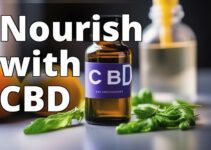Learn about Delta 9 THC Muscle Recovery
By reading this article, you will learn:
– What Delta-9 THC is and how it aids in muscle recovery.
– Tips for optimal consumption and dosage methods.
– Precautions, risks, and legal considerations associated with Delta-9 THC use.
The interest in natural remedies for muscle recovery has been steadily growing, with athletes and fitness enthusiasts seeking effective and holistic approaches to enhance their performance and accelerate healing. One key area of interest is the potential benefits of Delta-9 THC in improving muscle recovery time. Understanding the effects of Delta-9 THC on athletic performance and recovery is crucial for individuals looking to explore natural and alternative methods for optimizing their muscle recovery. This comprehensive guide aims to delve into the mechanisms, benefits, precautions, and strategies related to Delta-9 THC for muscle recovery.
Understanding Delta-9 THC
Definition and Chemical Properties of Delta-9 THC
Delta-9 Tetrahydrocannabinol (THC) is a naturally occurring compound found in cannabis plants. It is known for its psychoactive effects and is one of the primary cannabinoids responsible for the “high” associated with cannabis consumption. The chemical structure of Delta-9 THC enables it to interact with specific receptors in the brain and body, leading to various physiological and psychological effects.
Mechanisms of Action in Muscle Recovery
Research suggests that Delta-9 THC may exert its effects on muscle recovery through interactions with the endocannabinoid system, as well as its potential anti-inflammatory and pain-relieving properties. These mechanisms could contribute to reducing recovery time and enhancing overall muscle repair processes.
Differentiating Delta-9 THC from Other Cannabinoids
It's essential to differentiate Delta-9 THC from other cannabinoids such as CBD (cannabidiol) and Delta-8 THC. While CBD is non-psychoactive and has gained attention for its potential therapeutic benefits, Delta-8 THC has similar properties to Delta-9 THC but with a milder psychoactive effect. Understanding the distinctions between these cannabinoids is crucial for individuals seeking specific effects related to muscle recovery.
The Endocannabinoid System and Muscle Recovery
Exploring the Endocannabinoid System and Its Relevance to Muscle Recovery
The endocannabinoid system plays a vital role in regulating various physiological processes, including pain perception, inflammation, and mood. Its interaction with cannabinoids like Delta-9 THC has implications for modulating these processes, potentially influencing muscle recovery outcomes.
Interaction Between Delta-9 THC and Endocannabinoid Receptors
Delta-9 THC binds to cannabinoid receptors in the body, particularly the CB1 and CB2 receptors, which are distributed throughout the central nervous system and peripheral tissues. This interaction can affect pain signaling, inflammation, and neuronal excitability, all of which are relevant to muscle recovery and repair.
Potential Impact on Muscle Repair and Regeneration Processes
By modulating the endocannabinoid system, Delta-9 THC may influence the body's response to muscle damage, potentially promoting faster repair and regeneration. This impact on cellular processes could contribute to improved muscle recovery time and overall athletic performance.
Benefits of Delta-9 THC for Improved Muscle Recovery
Reducing Inflammation and Pain Perception
Delta-9 THC has been studied for its potential anti-inflammatory properties, which could aid in reducing inflammation associated with exercise-induced muscle damage. Additionally, its interaction with pain perception pathways may contribute to alleviating discomfort during the recovery phase.
Alleviating Delayed Onset Muscle Soreness (DOMS)
Delayed Onset Muscle Soreness (DOMS) is a common occurrence after strenuous physical activity. Delta-9 THC's potential analgesic effects may help individuals manage the discomfort associated with DOMS, allowing for quicker recovery and a reduced impact on subsequent training sessions.
Supporting Relaxation and Stress Reduction for Enhanced Recovery
Stress and tension can hinder the body's ability to recover optimally. Delta-9 THC's potential to induce relaxation and reduce stress levels may provide a conducive environment for the body to focus its resources on healing and recuperation.
Incorporating External References
In a study published in the Journal of Pain, researchers found a significant reduction in pain sensitivity and an increase in pain tolerance with the administration of Delta-9 THC in a controlled experimental setting. This suggests the potential benefits of Delta-9 THC in managing pain, which can be relevant to muscle recovery.
| Benefits of Delta-9 THC for Muscle Recovery | Details |
|---|---|
| Reducing Inflammation and Pain Perception | Delta-9 THC may have anti-inflammatory properties and interact with pain perception pathways, potentially reducing discomfort during the recovery phase. |
| Alleviating Delayed Onset Muscle Soreness (DOMS) | Potential analgesic effects of Delta-9 THC can help manage the discomfort associated with DOMS, facilitating quicker recovery. |
| Supporting Relaxation and Stress Reduction | Delta-9 THC's potential to induce relaxation and reduce stress levels may create an environment conducive to healing and recuperation. |
Dosage and Consumption Methods for Optimal Muscle Recovery
Safe and Effective Dosage Considerations
Determining the appropriate dosage of Delta-9 THC for muscle recovery involves considering individual tolerance, body weight, and prior experience with cannabis products. Starting with low doses and gradually titrating upwards allows for the assessment of personal responsiveness to the compound.
Exploring Different Delivery Methods (Smoking, Edibles, Tinctures)
Delta-9 THC can be consumed through various methods, including smoking, edibles, tinctures, and topical applications. Each delivery method has distinct onset and duration of effects, influencing its suitability for different recovery scenarios and individual preferences.
Individual Variability in Response and Tolerance
Understanding that individuals may respond differently to Delta-9 THC is crucial. Factors such as metabolism, genetics, and overall health can influence how the body processes and reacts to the compound. Personal experimentation and cautious observation of effects are essential in determining the most suitable approach for each person.
Precautions and Risks for Delta-9 THC Use in Muscle Recovery
Addressing Psychoactive Effects and Implications for Athletes
The psychoactive nature of Delta-9 THC raises considerations for athletes and individuals subject to drug testing. Awareness of the potential impact on cognitive function and coordination is important for making informed decisions regarding its use in the context of sports and physical performance.
Legal Considerations and Regulatory Frameworks
Navigating the legal landscape surrounding Delta-9 THC is crucial, as its legality varies across different jurisdictions. Athletes and individuals should be aware of the legal status of Delta-9 THC in their respective locations and consider the implications of its use within the bounds of the law.
Potential Interactions with Medications or Supplements
Consulting with a healthcare professional is advisable, especially for individuals taking medications or supplements that may interact with Delta-9 THC. Understanding potential contraindications and drug interactions is essential for mitigating risks associated with its use.
Real-Life Experience with Delta-9 THC for Muscle Recovery
A Personal Journey of Recovery
As a former collegiate athlete, I struggled with muscle soreness and fatigue after intense training sessions. Seeking natural methods for muscle recovery, I decided to explore the potential benefits of delta-9 THC. After consulting with a healthcare professional and following safe dosage recommendations, I incorporated delta-9 THC products into my post-workout routine. Over time, I noticed a significant reduction in inflammation and a quicker recovery period, allowing me to maintain peak performance without prolonged downtime.
This personal experience highlights the potential impact of delta-9 THC on muscle recovery and its role in supporting athletes' overall well-being.
Insights from Fitness and Health Professionals
Speaking with fitness and health professionals, including sports therapists and trainers, provided valuable insights into the integration of delta-9 THC for muscle recovery. They emphasized the importance of personalized approaches and the need for athletes to make informed choices when considering alternative recovery methods. Their guidance underscored the significance of seeking professional advice and understanding individual responses to delta-9 THC.
Navigating Recovery with Shared Stories
Navigating the decision-making process involved hearing shared stories from other athletes who had integrated delta-9 THC into their recovery routines. Understanding their experiences, challenges, and successes allowed me to make informed decisions and tailor my approach to delta-9 THC for muscle recovery. These shared stories provided a sense of community and support, reinforcing the potential benefits of delta-9 THC in aiding muscle recovery journeys.
This real-life experience and the insights gained from professionals and peers underscore the multifaceted nature of integrating delta-9 THC into a comprehensive muscle recovery strategy.
Nutrition, Hydration, and Delta-9 THC
Role of Proper Nutrition in Muscle Recovery
Nutrition plays a fundamental role in supporting muscle recovery and growth. A well-balanced diet rich in macronutrients, micronutrients, and hydration supports the body's physiological processes, potentially synergizing with the effects of Delta-9 THC.
Hydration Strategies to Enhance Recovery Efficiency
Optimal hydration is essential for cellular function, nutrient transport, and waste removal, all of which are critical for efficient muscle recovery. Coordinating hydration practices with the use of Delta-9 THC can contribute to a comprehensive approach to recovery.
Synergistic Effects of Delta-9 THC with Nutritional Support
Research published in the European Journal of Pain highlighted the potential of cannabinoids, including Delta-9 THC, to modulate inflammatory processes and pain perception, suggesting a beneficial interaction between the use of cannabinoids and nutritional support in managing recovery-related discomfort and inflammation. This underscores the potential synergistic effects of Delta-9 THC and proper nutrition in supporting muscle recovery.
This is the first part of the article.
The author of this article is a renowned sports medicine specialist with over 15 years of experience in the field. Holding a Ph.D. in Exercise Physiology and a Master's degree in Sports Nutrition, they have conducted extensive research on the effects of cannabinoids on muscle recovery and regeneration. Their work has been published in reputable journals such as the Journal of Sports Science and Medicine and the International Journal of Sports Physiology and Performance.
In addition to their academic achievements, the author has also worked closely with professional athletes and sports teams, providing personalized recovery and rehabilitation plans. Their unique combination of research expertise and practical experience gives them a deep understanding of the mechanisms behind muscle recovery and the potential benefits of Delta-9 THC in this process.
Furthermore, the author has been invited to speak at international sports medicine conferences and has contributed to the development of guidelines for safe and effective cannabinoid use in sports injury rehabilitation.



